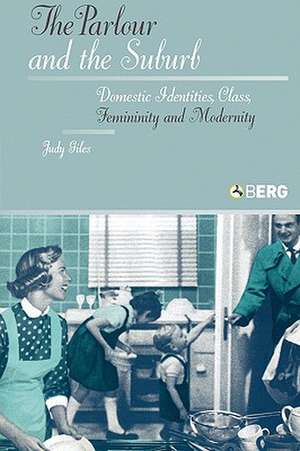The Parlour and the Suburb: Domestic Identities, Class, Femininity and Modernity
Autor Judy Gilesen Limba Engleză Paperback – 31 dec 2003
| Toate formatele și edițiile | Preț | Express |
|---|---|---|
| Paperback (1) | 230.51 lei 6-8 săpt. | |
| Bloomsbury Publishing – 31 dec 2003 | 230.51 lei 6-8 săpt. | |
| Hardback (1) | 713.96 lei 6-8 săpt. | |
| Bloomsbury Publishing – 31 dec 2003 | 713.96 lei 6-8 săpt. |
Preț: 230.51 lei
Preț vechi: 265.42 lei
-13% Nou
Puncte Express: 346
Preț estimativ în valută:
44.11€ • 46.05$ • 36.50£
44.11€ • 46.05$ • 36.50£
Carte tipărită la comandă
Livrare economică 05-19 aprilie
Preluare comenzi: 021 569.72.76
Specificații
ISBN-13: 9781859737026
ISBN-10: 1859737021
Pagini: 212
Ilustrații: 5 b&w illustrations, bibliography, index
Dimensiuni: 156 x 234 x 15 mm
Greutate: 0.33 kg
Ediția:New.
Editura: Bloomsbury Publishing
Colecția Berg Publishers
Locul publicării:London, United Kingdom
ISBN-10: 1859737021
Pagini: 212
Ilustrații: 5 b&w illustrations, bibliography, index
Dimensiuni: 156 x 234 x 15 mm
Greutate: 0.33 kg
Ediția:New.
Editura: Bloomsbury Publishing
Colecția Berg Publishers
Locul publicării:London, United Kingdom
Caracteristici
Also available in hardback, 9781859737965 £50.00 (January, 2004)
Notă biografică
Judy Giles is Reader in Gender and Cultural Criticism, York St John's College
Cuprins
IntroductionPart 1Chapter 1 - Domestic PlacesChapter 2 - Domestic ServiceChapter 3 - Getting and SpendingPart 2Chapter 4 - 'Middlebrow' Fiction and ModernityChapter 5 - Narratives of modernity in the memories of working-class womenConclusionBibliography
Recenzii
This book should attract a wide readership from cultural and social historians, an it provides a valuable context for the growing body of research on consumption, credit, and housing in twentieth-century Britain.
A wide-ranging and ambitious rethinking of narratives of modernity The analysis and argument are perceptive, illuminating and eloquently expressed, making the text a pleasure to read.
Using a wide range of sources, Judy Giles has produced a fascinating study of the making of the modern woman and a wonderfully lucid and stimulating re-reading of the relation of modernity to suburbia, domesticity, consumerism and the home.
This fascinating book convincingly subverts the classic anti-home rhetoric of modernity. Innovative and challenging, it is an important work and a must for historians of women in modern society.
The Parlour and the Suburbs displays a tender sensitivity toward working-class women's aspirations and circumstances, and argues convincingly that bourgeois and middle-class white British women experienced modernization differently.
A fresh perspective on the interactions between the individual woman and domesticity.
A wide-ranging and ambitious rethinking of narratives of modernity The analysis and argument are perceptive, illuminating and eloquently expressed, making the text a pleasure to read.
Using a wide range of sources, Judy Giles has produced a fascinating study of the making of the modern woman and a wonderfully lucid and stimulating re-reading of the relation of modernity to suburbia, domesticity, consumerism and the home.
This fascinating book convincingly subverts the classic anti-home rhetoric of modernity. Innovative and challenging, it is an important work and a must for historians of women in modern society.
The Parlour and the Suburbs displays a tender sensitivity toward working-class women's aspirations and circumstances, and argues convincingly that bourgeois and middle-class white British women experienced modernization differently.
A fresh perspective on the interactions between the individual woman and domesticity.












